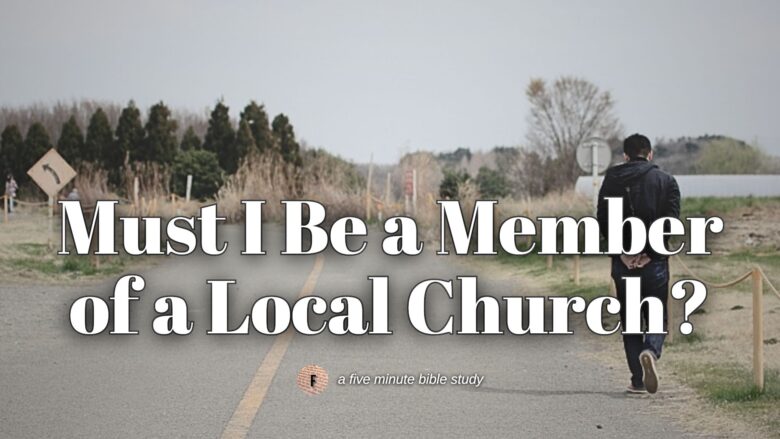Note: This article is broken up into five minute sections so that you can read it in digestible chunks. The ending of each five minute section is marked for your convenience.
It is not especially uncommon, when I knock on someone’s door to invite them to church or when I’m talking to a patient in the ER, for that person to tell me, “I don’t go to church”; yet, they believe in God; they consider themselves to be spiritual. It’s a flip of a coin whether or not the person goes on to declare how much they despise churches and preachers. I’ve had a few patients go on such rants. I’ve had a lot of people bring up their personal relationship with Jesus (which doesn’t need a church). Others are simply indifferent altogether about going to church. Still others, when asked, “Why is it that you don’t go to church,” recall a hell-preaching nun or “strict” church culture that soured them on the concept of “going to church.”
In keeping with these common responses, religious polling trends show that more and more Americans are becoming unchurched or “Nones.” “Nones” are people who identify as nothing in particular when it comes to religion/faith/spirituality. They aren’t necessarily atheist, agnostic, Protestant, Muslim, or anything in particular. 72% believe in God or a higher power.1 A recent Gallup poll revealed that 20-29% of Americans self-identify with this category, and this number is rapidly growing.2 Interestingly, an expert on this growing “nothing in particular” class, Ryan Burge, stated that many people are becoming Nones in the 15-22 yr. old window after being raised in religious homes and then “leaving the church.”3
Whether we are talking about Nones, unchurched people, or someone who claims to be a member of a certain denomination but hasn’t been to church in who knows when, let’s answer a simple question: must I be a member of a local church? Now, I realize that most unchurched people who read this won’t be instantaneously convicted and in the front row come Sunday morning. That begs the question, “Why are you writing this Aaron?” I’m writing this for anyone who is starting to question why they still go to church. I’m writing this for anyone who still has respect for what scriptures say, particularly on the subject of “going to church.”
Must I go to church? Must I be a member of a local church? I believe the answer is “Yes.” Here is my defense.
1. The word “church” means “an assembly.”
There is a common saying often repeated “The church is not the building, it’s the people.” And this does help distinguish the essence of “the church” from the external structures and forms that people often associate with “the church.” However, for all the help this saying offers, I fear it has hindered many from understanding a critical ingredient of what it means to be “the church.” The church is not just the people. The church is an assembly of God’s people. “Assembly” is literally part of the definition of ekklesia (the Greek word from which we get “church”).4 The English word “church” is a rather unfortunate translation, because it disguises this critical part of the definition.
Why is it so important to understand that the church is an assembly of people? Because this growing trend within Christianity of “I can have a personal relationship with Jesus without being a member of a local church,” cuts out this ingredient of assembly. And if God’s people never assemble, it’s hard to see how they maintain their identity as “the church.”
2. Individual Christians are only “members” of the church.
This point about individual Christians is just an extension of the previous point about assembly. I am convinced that many people think of themselves, individually, as “the church,” because I hear people talk this way. But again, if the church is an assembly of individuals, then the individuals themselves are not “the church” in the way we commonly think and talk.
Paul describes individual Christians this way in relation to the local church/assembly in Corinth, “Now [y’all] are the body of Christ, and members individually” (1 Cor. 12:27). He draws out this illustration of the local church being like a human body in the surrounding verses. “If the whole body were an eye, where would be the hearing? If the whole were hearing, where would be the smelling? But now God has set the members, each one of them, in the body just as He pleased. And if they were all one member, where would the body be?” (1 Cor. 12:17-19).
Individual Christians are part of the local body of Christ in the same way that an eye or a hand are part of any human body. No one would observe my severed hand in a surgical tray and say, “Look, there’s Aaron’s body!” They might say, “Hey, there’s Aaron’s hand!” or “Hey, there’s part of Aaron’s body!” In the same way, no one sees me at the grocery store and declares, “Look, there’s the Chapel Grove Church of Christ!” They might say, “Hey, there’s a member of the Chapel Grove Church of Christ!”
Paul uses four illustrations for the local church that help us understand our individual identity within the church. We have referenced one of these illustrations already: the body. Three more illustrations he uses are the temple of God, the family of God, and the flock of God. In Ephesians 2:19-22, Paul calls individual Christians “members of the household of God… being fitted together, grow[ing] into a holy temple in the Lord.” The apostle John compares individual Christians with “pillars” in the temple of God (Rev. 3:12). In 1 Timothy 3:15 (ESV), Paul calls the local church in Ephesus “the household (family) of God.” In Acts 20:28, Paul calls the same church in Ephesus “the flock,” alluding to a flock of sheep under the care of shepherds.
The point remains: individual Christians are only “members” of the church. One body part doesn’t make a body. One block doesn’t make a temple. One pillar doesn’t make a temple. One person doesn’t make a family. One sheep doesn’t make a flock. By myself, I have no identity. When I join myself with a local church/assembly/body, I have God given identity and function.
Five Minute Warning
3. There is a biblical pattern of church membership.
A. The Example of Paul
After Paul became a Christian by being baptized by Ananias, the Bible says, “He tried to join the disciples” at the local church in Jerusalem (Acts 9:26). The Bible then describes his membership with this local church: “So he was with them at Jerusalem, coming in and going out” (Acts 9:28). Some time later Barnabas and Saul traveled to and became members of a local church in Antioch. Luke records, “So it was that for a whole year they assembled with the church and taught a great many people. And the disciples were first called Christians in Antioch” (Acts 11:25-26).
B. The Example of Roman Christians
Notice how Paul describes the local churches in Rome. “Greet Asyncritus, Phlegon, Hermas, Patrobas, Hermes, and the brethren who are with them. Greet Philologus and Julia, Nereus and his sister, and Olympas, and all the saints who are with them” (Romans 16:14-15). These were small churches that met in the homes of the church members. These Christians were “with” one another in the sense that they assembled regularly and had an ongoing relationship with one another.
C. The Example of Epaphras
In Colossians, church membership is alluded to a little more directly. “Epaphras, who is one of your number, a bondslave of Jesus Christ, sends you his greetings” (Colossians 4:12; NASB). To be of their number doesn’t insinuate that they had a church roll per se, but it does imply that Epaphras was a committed member of the local church in Colosse.
D. Special Fellowship in a Local Church Was Expected
Fellowship means “joint participation.” This necessitates at least two people. And when we read the New Testament, we find Christians described as taking part in or admonished to take part in physical acts of special fellowship within the assembly of the local church: the communion and collection.5
Paul describes the communion service that took place every first day of the week in the local Corinthian church as follows: “The cup of blessing which we bless, is it not the communion (fellowship) of the blood of Christ? The bread which we break, is it not the communion (fellowship) of the body of Christ? For we, though many, are one bread and one body; for we all partake of that one bread” (1 Corinthians 10:16-17). This ordinance expects membership with a local church.
Regarding the Christian collection of monies that was supposed to be gathered up every Sunday at the weekly assembly of the church, Paul said this: “Now concerning the collection for the saints, as I have given orders to the churches of Galatia, so you must do also: On the first day of [every; ESV] week let each one of you lay something aside, storing up as he may prosper, that there be no collections when I come” (1 Corinthians 16:1-2). Read the text closely, and you will notice this was something that Christians were to do together on the first day of the week. This special act of fellowship was by the saints, for the saints. This ordinance expects membership with a local church.
E. Ordinary Fellowship with a Local Church Was Expected
Whereas the communion and collection were special acts of fellowship unique to Christians, Christians were also described as and admonished to have regular participation in one another’s daily lives.
Luke describes the first church(es) in Jerusalem in this way: “Now all who believed were together, and had all things in common…” (Acts 2:44). Luke goes on to add this: “So continuing daily with one accord in the temple, and breaking bread from house to house, they ate their food with gladness and simplicity of heart” (Acts 2:46). The Holy Spirit seemingly presents Acts 2:41-47 as the model for local churches and new believers.
Other scriptures imply this expectation of ordinary fellowship with a local church. See Philippians 2:1-4, Galatians 6:2, and other scriptures within letters to local churches that admonish mutual edification.
4. The “assembly” of the church is special, and God’s people are expected to be in it.
Here is a small sample from the Psalms which manifest the special nature of God’s people assembling for worship.
- “I will declare Your name to My brethren; in the midst of the assembly I will praise You.” (22:22)
- “I will give You thanks in the great assembly; I will praise You among many people.” (35:18)
- “God is greatly to be feared in the assembly of the saints, and to be held in reverence by all those around Him.” (89:7)
It’s true, you can worship God on your own while fishing or sitting in a tree stand or riding down the road, but none of these compare with worshiping God in the assembly of His people, the church. Christians are told to not forsake the assembly of the church, and to take the assembly as an occasion to stir each other up and exhort one another (Hebrews 10:24-25)! It is in the assembly that the special fellowship of Christians takes place (see above).
Why is the assembly of the church so important to God? This is my opinion, but I believe that when God’s people come together as an assembly to worship Him in prayer and song and praise, this is a crude dramatization of heaven. In Revelation 7:9-17, John gives us a peak into heaven and what it will be like. It looks a lot like an assembly of the church. And this just can’t be replicated by yourself on the lake.
5. God’s biblical plan for church leadership in local churches implies the need for church membership.
If there is one thing in scripture that speaks to God’s design that there be local churches and Christians being faithful members of local churches, it’s God’s directives for qualified and ordained leadership in local churches. There are virtually two whole chapters of scripture dedicated to the qualifications of church leadership (1 Timothy 3; Titus 1).
Five Minute Warning
Pick up your Bible and hold the pages of the New Testament in your hands. Now, think about how judicious God was in what He decided to include in there. John says that if everything Jesus did was written in books, there wouldn’t be enough books to contain it all (John 21:25)! Yet, He dedicated two chapters to church leadership! Why fill up precious space with that if it doesn’t even matter that you are a member of a local church anyway? Because it does matter.
The Ephesian elders were admonished to protect “the flock,” which was a reference to the local church that they led (Acts 20:28). One sheep by him/herself is not a flock. Shepherds need sheep and sheep need shepherds. Any plan by God for church leadership is a plan for church membership.
6. Individual Christians need the help of the local church.
Think back to how Paul compares the local church to a body. Using that illustration again, Paul said, “But now indeed there are many members, yet one body. And the eye cannot say to the hand, “I have no need of you”; nor again the head to the feet, “I have no need of you” (1 Cor. 12:20-21). But what does the modern day “Christian” often say about the local church? “I have no need of you.” “I don’t want you.”
People who have had bad experiences with a local church might have to pause to swallow the truth of Paul’s statement. Paul wrote 1 Corinthians to a local church that had a LOT of problems! Just because you went to a church that hurt you doesn’t mean that all churches are bad. Just because you went to a church with problems doesn’t mean it was necessarily bad either. The church is an assembly of people, and I’ve never met people who didn’t have problems. We have to remember, the local church is God’s design, not man’s. And God says you need a local church. You are not self-sufficient without a local body of believers.
7. Miscellaneous observations from scripture that teach the need for local church membership.
A. All the 13 letters of Paul were written to… local churches with the exception of Philemon.6
B. Revelation was written to seven local churches in Asia Minor.
Five of the seven churches had major problems that Jesus demanded they fix. His solution was not to do away with the local church concept. His solution was to work together unto repentance.
C. In Bible times, you had to be part of the local church to know God’s word.
They didn’t have personal Bibles to take home and read in the first century. Here are two examples from scripture of how Christians learned the word of God.
“Now when this epistle is read among you, see that it is read also in the church of the Laodiceans, and that you likewise read the epistle from Laodicea” (Colossians 4:16).
“I charge you by the Lord that this epistle be read to all the holy brethren” (1 Thessalonians 5:27).
“He who has an ear, let him hear what the Spirit says to the churches” (Revelation 2:7).
Imagine being a “Christian” in those days, who was not involved with any local church, and missing out on what the Holy Spirit “says to the churches.”
D. Many passages in the New Testament make no sense in the absence of local churches.
These verses are just a sample, but consider this as homework: Hebrews 10:25; James 2:2; Matthew 18:15-17; Colossians 4:16; Acts 2:46; Acts 20:28; 1 Timothy 3:1-15; Titus 1:5-9; 1 Corinthians 14:34-35; 1 Timothy 5:17-19; 1 Corinthians 16:1-2, 15-18; Romans 16:13-16; 1 Thessalonians 5:12-13; Hebrews 13:17, 24.
Conclusion
Country songs commonly refer to scenes such as driving alone down a country backroad or fishing on the lake as “my church.” But if “the church” isn’t the building, neither is it “the lake” or a “country backroad.” No personal utopia will ever be able to properly substitute for the local assembly of God’s people gathered together to worship Him as He asked to be worshiped. Making a church is like making a model car: there is some assembly required. If you are not part of a local church, I strongly admonish you to become one. If you need help with this, please contact me at ambattey@yahoo.com.
1 “Key findings about Americans’ belief in God”. Pew Research Center. April 25, 2018.
2 “Religion Historical Trends”. Gallup. 2020.
3 “Who are the ‘Nones?'” Think Biblically Podcast, 16 January 2024, https://open.spotify.com/episode/5lYyQ6zLABu2Rls9jA1qGg?si=BtBa2eO5RSGnMC9GaChDhw
4 Bauer, Walter, et al. A Greek-English Lexicon of the New Testament and other Early Christian Literature–Third Edition. University of Chicago Press, 2000
5 These acts of fellowship were/are special, because they were given uniquely to Christians and are meant to be observed uniquely by Christians.
6 There is good evidence within Titus and 2 Timothy that they were written to the church at Ephesus and Crete, though addressed to Titus and Timothy. Notice the plural “you” in Titus 3:15 and 2 Timothy 4:22.



